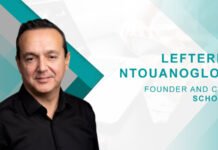1. Tell us about your role at Thymometrics?
I helped found Thymometrics and started as the CTO, helping to define and build the product and the platform. Since then I have taken on the CEO role which involves me in all aspects of the business from strategy, through sales and marketing, finance, and still helping to drive the product and platform forward. I get to spend a lot of time talking with customers, both prospective and existing. Finding out what companies want and need, and helping existing customers get the most from their platform. I still love the tech side, how we solve problems with technology, but I think the mix of different things is what makes it interesting.
2. Can you tell us about your journey into this market?
My background is very much technology, building bespoke systems for all sorts of applications, from the mundane to the bizarre. I never knew it at the time, but I have always been passionate about employee engagement. I say I never knew it, as in my tech roles, I never knew there was a name for it! I met Hugh Tonks the co-founder of Thymometrics through an introduction and really liked his idea for a new product to innovate the employee survey space. I think we chatted for probably an hour and so and decided we should form a company and see if we could build a viable product. It all happened very quickly.
3. How do you think technology is upgrading HR sector?
HR has tended to follow in the tech space, perhaps as more cash and investment often goes into sales and marketing rather than HR. However, things have certainly changed now, and we are seeing HR being transformed by having the right technology tools. It frees HR up from administration and enables them to take the lead in driving forward with the companies most precious resource, its people.
4. How has digitalization contributed in making HR teams more efficient?
It changes not just the workload as so many manual tasks are now automated or self-service, but it enables data-driven decision making. In the past HR has sometimes been seen as a “fluffy science” due to the lack of data and evidence, but now real-time data supports management, cultural and organisational changes for the betterment of the organisation, its customers and employees.
5. Why do you think employee engagement surveys are important for companies of all size?
I would caveat that under perhaps 20 people you can often “get away” without it, but even then, you can start to have a “he/she who shouts loudest” driving the agenda. Surveys themselves are not great, we prefer to talk about employee feedback. Feedback meaning a loop, and not just a one-way gathering of information. For most companies, its people are the number one asset. As companies recognise this then ensuring we have ways of monitoring the health, engagement, wellbeing, and bottlenecks on an ongoing basis becomes essential not just an annual exercise. I would possibly ask the question how do companies of any size think they can possibly be as effective or successful without employee feedback mechanisms in place? I have heard some companies saying, our managers know their teams and they tell us what we need. I can guarantee that an anonymous feedback mechanism will throw up data that just does not get through those kinds of traditional approaches. You have to have anonymity, to have to tone down the loud voices so they speak with the same importance as everyone else. You have to collate the data, question it, clarify it, and eventually surface this as actionable data based on gathered facts not just anecdotal conversations in a corridor or gut instinct.
6. What tips would you like to give to the employers to obtain better employee engagement?
Disruptive HR had a statement I loved, it was something like “treat your employees like adults and tear up the rule book”. That is not all of it, but it’s certainly part of it. “Don’t hire smart/talented people and then tell them what to do and how to do it”, that is another mantra I love. The rules should be built by the teams for the teams. If you feel you can’t trust your teams to do this right, then perhaps there is bigger issue here of management trust. Better engagement is about understanding the true value of your people, and then listening and working with them to achieve common goals. It is not about command and control, or setting goals and deadlines, or project management for that matter. Another quote I loved was “start with the why”. All team conversations should start with the “why” rather than the “what”. When the team gets the reasons behind any initiative, plan, or goal they become part of mission and the solution, rather than just a cog doing a small job as instructed.
7. What features of your employee engagement survey makes it a perfect tool for HR Professionals?
I cannot say it is the perfect tool for all companies, they need to decide that for themselves and probably there is no such thing as a perfect tool for all companies as they are all so different. What I can do however is talk about what we provide. We create simple and transparent mechanisms where engagement and related issues and explored and discussed. It doesn’t take much time, it is open and honest but employees can still be anonymous. This isn’t just about gathering data and presenting it. At Thymo we provide tools that help HR and Management work with their teams to understand/explore issues, find solutions and monitor the outcomes of any changes. It is a toolkit aimed at helping companies answer one simple question in the workplace “what can we improve next”?
8. What advice would you like to give to the technology Start Ups?
Be prepared for a lot of work. I have run a few start-ups. You must have passion, commitment and be prepared for long hours, long days, long months and even years. In saying all of that, if someone has a concept, they are passionate about I would not want to put them off. I’d suggest doing some initial research to ensure they are not alone thinking it’s cool idea (I sounded out the Thymo concept with some friendly HRD’s before we got too far down the road), do some rough financial plans, maybe build a prototype and ensure your pricing makes sense to the market and would let you survive. If you have all that, are prepared, and I guess you think it will be fun, then go for it.
9. What is the Digital innovation in sales technology according to you that will mark 2020?
I’m probably not the person to ask about Sales Technology. Right now there are some great products but I also feel consumers are barraged by a plethora of messages via targeted advertising and marketing automation. I think it is getting harder to see the wood for the trees. I think the Sales space would be a lot better if companies focussed on making their product available to their potential customers in ways that suit them (that’s the customer) best, and stop trying to continually persuade everyone they need a specific product or service.
10. How do you prepare for an AI-Centric world?
Don’t forget there is human intelligence, and sometimes a hunch will beat an algorithm. Actually, AI has been around for a long time. What is perhaps more interesting now is it is become easier for companies to apply ML and AI into practical spaces. I don’t think we should be AI centric though, AI should only ever be to help us do more of what we want to do, and perhaps achieve the kind of crunching and insights that would be just impractical due to the scale of challenge without them. It’s just a tool, same as so many other things we use. Oh, and one last thing, I’ve seen enough Arnie movies to know we should not give smart machines weapons just in case!
11. What are the major developments you are planning, in recent time?
We constantly review our platform and how to improve. We currently have initiatives going on in the mobile space, looking an insight dashboards, and how to apply ML and predictive analytics to generate actionable data.
12. Can you tell us about your team and how it supports you?
I don’t think it’s right to say the team support me. We work together to support each other. We invariable start with a discussion on an idea, task, initiative, or issue, and as a team we resolve it and then carve up who can do what best to deal with it.
13. What movie inspires you the most?
Gosh – inspire me is a tough one. I love lots of blockbusters (normally humorous ones) but they don’t inspire me, they just entertain me. I recently watched The Kings Speech, not for the first time, that is pretty inspirational. In truth I try not to spend too much time in front of the TV. It always feels like “killing time”.
14. We have heard that you have a very joyful work culture, so can you share with us some of the fun pictures of your workplace?
At the moment everyone is working from home so not much to see! It is awesome seeming people’s kids, pets, partners though interrupting daily video meetings! In terms of work culture though in my head it is essential the work place is not different from home, in the same way the person at work should be the same person they are at home. I like to see personalisation of workspaces, to hear people talking about home life and real-issues with their work colleagues. I hate hot-desking and impersonal spaces. That to me makes people into machines.
15. Can you give us a glance of the applications you use on your phone?
I have a game I play for relaxation. It’s nothing special, just a routine that sometimes is cool to switch your brain to. It’s like gardening, or painting or similar tasks. They occupy your brain in a different way which can be great if much of your work involves cognitive tasks. Other than that it’s nothing special really, Email, Twitter, LinkedIn, Teams, Zoom, a bunch of photos/videos, and a handful of games. I tend not to use my mobile that much, certainly less than my millennial children that’s for sure. I have found Instagram and other more popular apps on my phone but in truth that’s normally because one of my children has borrowed my phone and installed it so they can chat with their mates!

Jerry Pett Co-Founder and CEO, Thymometrics
As one of the founders of Thymometrics Jerry has played a key role in the development of the concept and technology. Prior to Thymometrics, he has founded two other technology start-ups and held senior leadership roles with TATA, Phones 4u and Dial-a-Phone. Jerry's background includes many years in consultancy delivering bespoke software solutions for companies such as Hewlett-Packard, Sony and Cadbury. After studying Physics & Electronics at Exeter University, Jerry originally worked in the embryonic home computer market and has worked through the dawn of the PC and the Internet.












